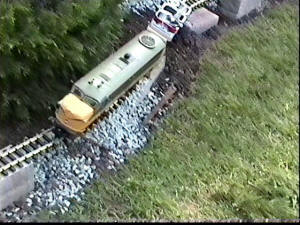 |
On the first of April, road
mileage was sufficient to open temporary service. We were doing fine until
the temporary trackage sagged at Cedar Curve, derailing the line's only
locomotive. Thankfully no injuries and the loco un-damaged. |
| A "contractor's" loco
was obtained in early April, as it was clear that even the big FA diesel was a
bit too much of a handful for our less-than-permanent way. A Porter 0-4-0 Tank loco showed up and was
immediately put to work hauling solder, paste, brushes and ballast as the trackwork was improved. It soon became clear that this loco had
insufficient range (and no sound) so a tender (with sound) was added and
the locomotive modified by the removal of the water tanks. |
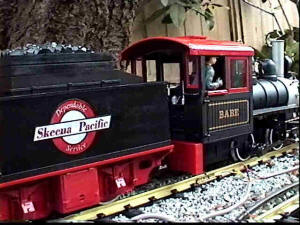 |
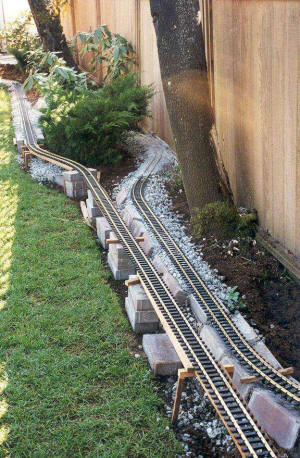 |
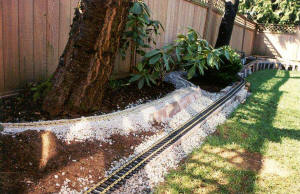 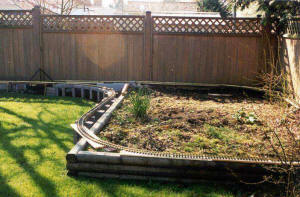 |
| |
By late Spring, the mainline was laid in an
extended dogbone, about 55 feet long. It wove around
two large cherry trees and circled the garden
patch and was very much located on a temporary foundation in
many places. |
Late-Spring also brought some new
challenges as the animals returned.
As seen here, a mole created the occasional earth movement, resulting in a small avalanche. Nigel, the
loco engineer, was not impressed. |
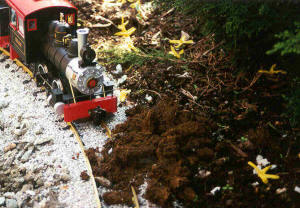 |
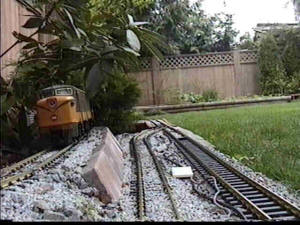 |
With just enough super-elevation,
the FA diesel could lean into the curves around the cherry
tree
and a passing track had been laid down,
creating the beginnings of
the
Kalum Yard. |
|
|
|
|
Leaving Kalum Yard, northbound |
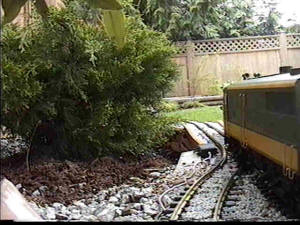 |
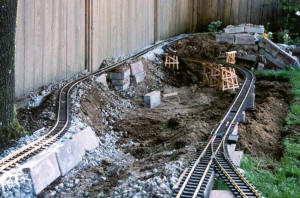 |
Early Summer had a slightly more permanent way
and big ideas. Exiting Kalum Yard northbound, we decided to
cross the Tseax lava flow with a trestle and bridge. To be a
little more spectacular, the trestle would be 'S" shaped. Here
you see the beginning, before Tseax mountain erupted and
created the lava flow! |
|
During construction, no matter how much of a
mess we were in, traffic on Skeena Pacific was always able to
proceed. By the end of each day of construction, trains were
able to operate. Though sometimes it meant getting a little less completed
and it was sometimes a scramble, it was often
soothing, very satisfying and always fun.
That particular thought became a "rule".
End of day, run a train. |
| By the end of 2000, the rail line consisted
of about 150 feet of mainline track laid mostly in ballast. It extended
down the south side of our backyard and partway across the
back to the west. The Kalum Yard had a mainline
and two passing tracks. |
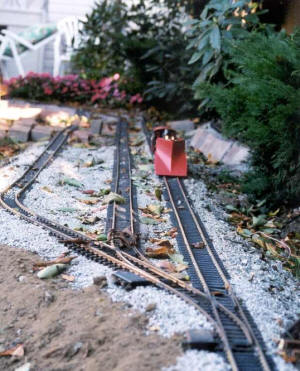 |
|
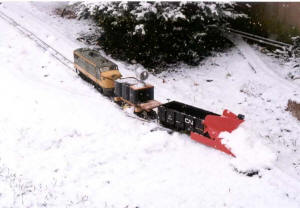 |
Year-end also brought snow. The Aristocraft Plow proved it could handle not only leaves
(above) but also the snow it was designed for. It worked even better when a four
pound brick was added as ballast and the front coupler mount
on the FA1 was reinforced with a metal bracket securely
hot-glued in place. |
|